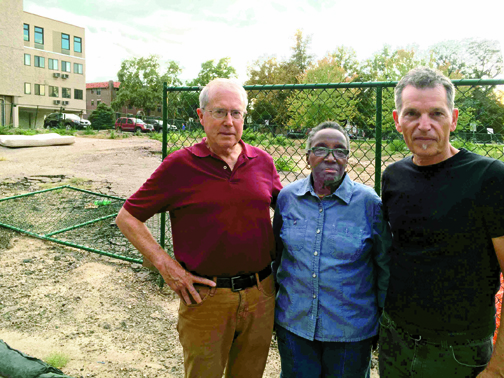Highly Esteemed Hirschfeld Wants To Build 108 No Parking Micro-Units On Historic Street
by Charles C. Bonniwell
The Humboldt Street Neighborhood Association was formed in 1992 during the summer of violence to fight gangs, drugs and frequent gunfire on the block of central Denver running between Park Avenue and Franklin Street. The block  was designated a Historic District in 2004. But the neighborhood is now facing one of its greatest threats from powerful, well-regarded and politically connected developer Barry Hirschfeld, who wishes to build on two small lots five-story micro-unit apartments which will have an incredible 108 units as well as a restaurant while not providing a single parking place.
was designated a Historic District in 2004. But the neighborhood is now facing one of its greatest threats from powerful, well-regarded and politically connected developer Barry Hirschfeld, who wishes to build on two small lots five-story micro-unit apartments which will have an incredible 108 units as well as a restaurant while not providing a single parking place.
The residents of Humboldt Street and the surrounding restaurants and commercial establishments believe the project will create a parking nightmare, lower property values and badly hurt businesses in the area.
The Humboldt Association joined forces with Curtis Park Neighbors to fight Hirschfeld. Curtis Park also faces no parking micro unit projects including one believed to be associated with Hirschfeld. David Engelken from the Humboldt Street Neighborhood Association stated, “We would like to sit down with Mr. Hirschfeld to try to work out a ‘win-win’ scenario, but after one meeting, he has totally stonewalled the neighborhood groups on this matter.”
Millennials Never Own Cars?
Hirschfeld and other similar developers have claimed that millennials who will live in the extremely small units will not own cars and therefore their projects will not result in an endless fight over a very limited number of on street parking spaces. That claim has been refuted by, among others, Denver Councilwoman Debbie Ortega who went on a fact-finding mission to Seattle concerning micro unit projects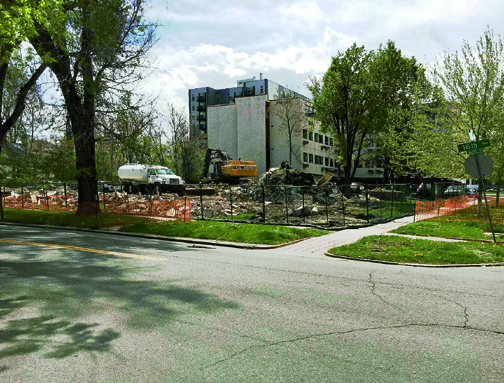 several years back. She noted in a letter dated January 27, 2016, that: “The developer claimed that tenants did not own cars, but we met some of the tenants who were car owners and they described their frustrations of having to park blocks away to carry groceries home.”
several years back. She noted in a letter dated January 27, 2016, that: “The developer claimed that tenants did not own cars, but we met some of the tenants who were car owners and they described their frustrations of having to park blocks away to carry groceries home.”
UCLA urban planning professor Donald Shoup has also noted the inner city traffic congestion is often caused “by people who have gotten where they want to be, but are cruising around looking for a place to park.”
Zoning Loophole
Several years ago high density real estate developers discovered what they believed was a loophole in the Denver zoning code which was revised in 2010 to permit lots equal or smaller than 6,250 square feet to be exempt from any and all parking requirements. The amendment was apparently envisioned to allow redevelopment of small commercial spaces such as exist in the Washington Park area and on South Pearl Street.
But it turns out there are over 4,000 such lots all over the city from downtown to the Country Club area. Horrified what such developments would do to the parking in many residential neighborhoods, the City Council placed a moratorium on such developments and appointed a task force to see how the code could be modified but quixotically grandfathered in some 12 existing projects including three from the highly connected Hirschfeld’s. Since the 2010 exception already exists in the Code, no City Council approval is needed for any proposed micro-unit project without parking, including Hirschfeld’s projects. Only a simple building permit is required from the Community Planning and Development Department.
Hirschfeld had a no parking micro-unit project planned for 135 Adams Street in Cherry Creek North which he had made public but had to retreat from, due to overwhelming neighborhood opposition.
However in 2015 Hirschfeld, through an entity titled Pando Holdings Inc., acquired two small lots of 6,250 square feet each at 1570 and 1578 Humboldt Street that housed two small, historically significant, medical buildings. The opposition to Hirschfeld points out that his project is on what is in effect a 12,500 square foot lot and once again is in violation of the spirit if not the language of the 2010 amendment.
Ethically Challenged Brad Buchanan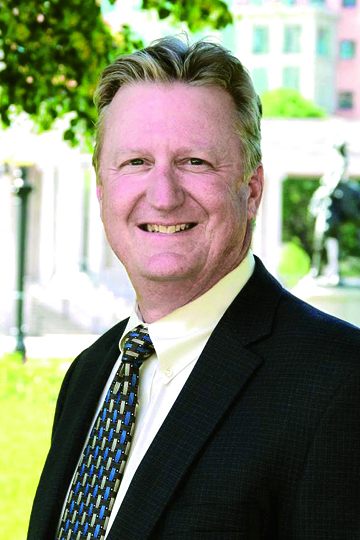
Denver’s Community Planning and Development Department, however, is generally deemed to be controlled by high density developers through Executive Director Brad Buchanan, a developer himself. The Department apparently gave the go-ahead for the micro units on the Humboldt lots and Hirschfeld quickly mowed down any trees in the area and leveled the buildings which finally gave the alert to the neighborhood association of the project. While a demolition notice would be required by law to be posted on the properties none was ever noticed by any resident of the neighborhood.
The granting of the permit to construct the micro units has been appealed to the Denver Board of Zoning Adjustments on the basis that the no parking exemption was for small, commercial developments and existing buildings. While the Board of Adjustment was intended to act as a check and balance on the Community Development Department, in recent years it has acted as little more than a rubber stamp. It is not known when, if ever, the present Board has overturned the granting of a building permit.
Moreover, like the Board of the Community Planning itself, all of the members of the Zoning Adjustment Board have been appointed by Mayor Hancock, making it highly unlikely they will vote to overturn anything deemed important to the mayor. Mayor Hancock has a strong reputation for removing anyone who acts independently from the wishes of his office on boards throughout the city.
Hope Springs
The opposition to the Hirschfeld project was headed up by Dave Engelken and Bob Hickman from Humboldt Street and Matina Soutsos and Kim Nytes from Curtis Park organization. While successfully challenging Mr. Hirschfeld is deemed by many to be a difficult proposition, even obtaining a moratorium itself was originally considered a long shot. The representatives of the Humboldt Street and Curtis Park organizations approached Councilman Albus Brooks (who represents the Humboldt Street area on City Council) with a complete draft of a proposed moratorium. Brooks is generally deemed to be highly pro developer, but also desires to succeed Michael Hancock as mayor of Denver.
While initially resistant, Brooks suddenly acquiesced to carry a moratorium resolution and in fact set it for first reading without notifying the proponent neighborhood groups that their proposal was being considered by the City Council. The Denver Post on July 20 came out with an editorial supporting the moratorium without speaking with anyone in the neighborhood groups. The City approved the same by a unanimous 12-0 vote. Councilwoman Mary Beth Susman who had vocally indicated her likely opposition to such a moratorium strangely was not present for the vote.
While the moratorium would never have occurred absent the hard work and diligence of the Humboldt and Curtis Park members, observers of the City Council have surmised that a fix must have been in for a 12-0 vote to occur putting a moratorium on any type of real estate development in the City and County of Denver. Larger developers may have been upset that small micro unit projects would take up most of the on-street parking in many neighborhoods making their larger developments with some, but inadequate, parking commercially unviable.
Pat Hamill, the Chairman and CEO of Oakwood Homes, LLC, who alle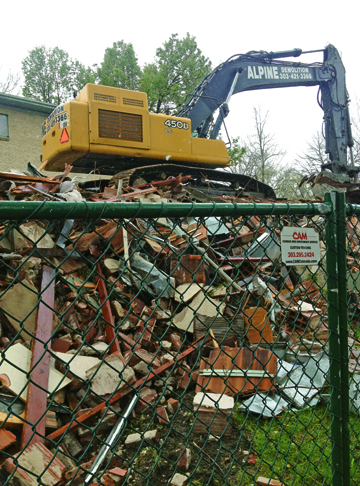 gedly controls the mayor and the city, would have had to approve the same. Hamill is the co-chair of Colorado Concern a group of business leaders whose critics accuse them of being a little more than high powered crony capitalists claiming to be looking out for the public interest.
gedly controls the mayor and the city, would have had to approve the same. Hamill is the co-chair of Colorado Concern a group of business leaders whose critics accuse them of being a little more than high powered crony capitalists claiming to be looking out for the public interest.
Hirschfeld serves with Hamill on the Board of Directors for Colorado Concern and it is assumed that it would have been easy for him to arrange with Hamill to exempt out his projects from the proposed moratorium. Logically if the parking exemption was for traditional small business commercial projects and not residential units there would be no purpose in grandfathering in Hirschfeld’s and the other projects.
Hirschfeld’s Sterling Reputation
Hirschfeld’s family owned for generations A.B. Hirschfeld Press, one of the largest commercial printers in the Rocky Mountain region, which closed its doors in 2009 after operating for 102 years. Unlike Denver developers such as Peter Kudla of Metropolitan Homes who are viewed by some as the dregs of humanity, Barry Hirschfeld himself has a strong reputation for philanthropy in the community and is held in high regard throughout Denver.
But the Humboldt micro unit project has damaged that reputation for some. He is accused of rank hypocrisy for going on community television adamantly opposing any high residential density for the church property located at Colorado Boulevard and Bayaud near his Hilltop home while pushing massive density with no parking in other neighborhoods in the city for his own profit.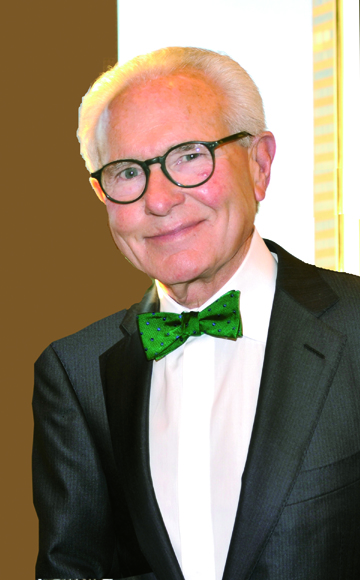
Andrew Gutshall of Denver perhaps typified the disappointment in Hirschfeld felt by many when he commented on the website featuring a petition opposing the project:
“I live in the area and will be negatively impacted by this development’s lack of parking for cars or bicycles. Obviously Mr. Hirschfeld won’t be impacted as he lives in a much more affluent neighborhood. I’m disappointed that a member of a family (4th Gen) of Denver would have such little regard for his fellow citizens all for the love of profit. Mr. Hirschfeld is an example of what is wrong with our economy and how developers are raping Denver in this latest ‘growth’ spurt. Deplorable!”
Mr. Hirschfeld did return the call from the Chronicle to get his perspective on the dispute, but politely indicated that he did not believe any useful purpose would be served in publicly commenting on the matter.

